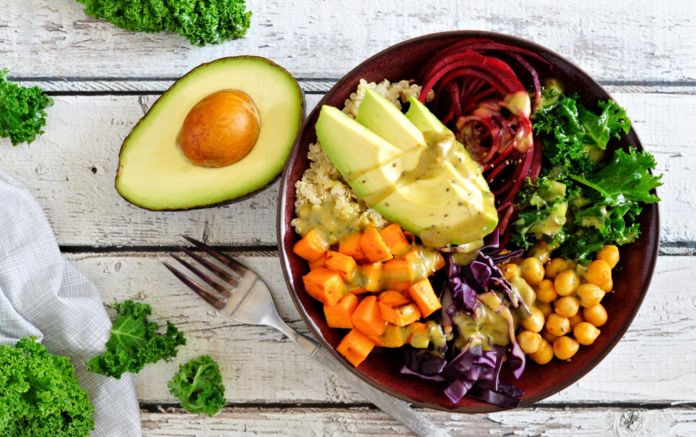A healthy diet can be the key to your good health. It can help you feel more energetic, improve your mood, and lower your risk for certain diseases.
A well-balanced diet includes a variety of fruits, vegetables, whole grains, dairy, and a source of protein. It can also reduce your risk for heart disease and some cancers.at a Well-balanced Diet
A well-balanced diet helps you maintain a healthy weight, boosts your energy, gives you more energy for exercise, allows better sleep and improves brain function. It also helps prevent diseases and health complications.
A balanced diet includes a variety of nutrient-rich foods from all the food groups, including fruits, vegetables, grains, dairy, proteins and fats. These foods are full of vitamins, minerals and other nutrients that your body needs to keep healthy and functioning properly.
Your diet should include a range of fats, with no more than 10 present of your daily calories coming from saturated or Tran’s fats. Saturated fats come from foods like meat, butter and cheese, while unsaturated fats are found in vegetable oils (such as olive, canola and sunflower), oily fish and avocados.
Limiting saturated fats is the key to improving your health and reducing your risk of heart disease. They are linked to high levels of LDL cholesterol and can increase your chances of developing heart problems.
Unsaturated fats, on the other hand, are important for lowering cholesterol levels and promoting healthy cell function. They are found in some nuts and seeds, nut butters and oily fish.
Avoid fried or processed foods, as they are often packed with saturated or solid fats, added sugar and salt. Instead, eat grilled or baked dishes or salads.
Try to eat fruit and veg at every meal, as they are an excellent source of fibre, vitamins and antioxidants. They are also a good source of water and provide essential minerals.
Avoid foods that are high in calories, fat and added sugars – biscuits, cakes, ice cream, chocolate, sweets and fizzy drinks. These can be occasional treats, but don’t eat them as often as you would like to or on a regular basis.
2. Exercise Regularly
Exercise is a critical part of your diet, not only for your physical well-being but also to help improve your mental health. It can boost your immune system, reduce stress and increase resilience to difficult life situations.
It can also make you feel good – with more energy, a happier mood and better sleep. Exercising regularly can even change the levels of chemicals in your brain, such as serotonin and endorphins, which affect your mood and can help you deal with mental health conditions like depression or anxiety.
There are many ways to get exercise – from walking or dancing to swimming or running. However, it’s important to choose activities that are appropriate for your level of fitness.
Regular exercise is essential for maintaining a healthy body weight and to prevent health problems such as heart disease and high blood pressure. Fildena 150 mg can improve your cholesterol levels, boost energy and lower your risk of cancer.
Increasing your level of exercise can also help you lose weight and keep it off. Often, this can be achieved by working out at least five times a week for a minimum of 30 minutes each time.
If you’re struggling to stick with an exercise routine, a simple solution is to set goals that are specific and measurable. Keeping a fitness tracker can help you monitor your progress and keep you motivated.
A recent study suggests that people who are making changes to their nutrition and exercise habits at the same time have better outcomes. In this study, participants who improved both their diet and exercise had better eating habits, lower blood cholesterol levels, higher muscle mass, and a greater sense of wellness than those who focused on just one aspect at a time.
3. Manage Your Portion Sizes
One of the most important tips for improving your nutrition and health is to manage your portion sizes. Whether you are trying to lose weight or just want to develop healthy eating habits, portion control is a key factor for improving your health and fitness.
Portion size can vary depending on what you eat, but it should be a good balance between calories and nutrients to provide you with energy to carry out your daily activities. This is particularly true for snacks, which often contain more than one serving of food.
Many people misunderstand the difference between serving size and portion size, which can lead to overeating. For example, a box of crackers may say the serving size is 4 crackers but you could easily eat 10 crackers without realizing it!
Another common problem is oversized packaging or large containers of foods. Often, foods served this way have much more calories than you realize!
This is especially the case at restaurants. Instead of “cleaning your plate,” try to ask for half or smaller portions. And don’t go back for seconds unless you are completely full!
Eating slowly is also an important way to help you eat the right amounts. Studies show that people who eat slowly tend to feel more satisfied and have less hunger.
In addition, avoiding distractions at mealtimes, such as watching TV or listening to music, can be a great way to help you eat the right amounts. When you are more mindful of how much you’re eating, you can eat a healthier, nutrient-dense diet and achieve your health goals!
While counting calories and measuring your food is not a requirement for most people, learning what healthy portion sizes look like can help you make the best choices at meals. Once you have a better understanding of how to choose healthy foods, selecting the right amount will become second nature!
4. Eat a Healthy Snack
A healthy snack can keep your body fuelled and help you avoid overeating or getting bored with regular meals. Moreover, it helps regulate blood sugar levels, lowering the risk of diabetes and heart disease. Although you can take some medicine like Fildena 200 to improve blood flow and relax blood vessels.
Ideally, your snacks should be nutrient-dense, contain a balanced combination of carbohydrates, protein and fat, and have a low sugar and salt content. Some of the most nutritious options include fruits, vegetables, whole grains, low-fat dairy and nuts or seeds.
Choose your snacks carefully, paying attention to ingredients and portion sizes. Many processed and packaged foods are full of unhealthy fats, sodium and added sugars.
Make sure your snacks are a good source of fibre. High-fibre snacks are more filling and can help you stay satisfied for longer periods of time.
Snacks can also boost your energy and mood. Fruits, vegetables and a few nuts or low-fat yogurt are all excellent choices for boosting your energy level and improving your mental well-being.
Eat snacks on a schedule to help curb your appetite and prevent overeating at your next meal. Irregular snacking, on the other hand, can result in weight gain and reduce the quality of your diet.
It is also important to snack on a variety of foods to ensure you get adequate vitamins and minerals. For example, a post-workout snack that contains both carbohydrates and protein will provide your muscles with the fuel they need to recover faster.
If you need a quick pick-me-up between meals, try a cup of fruit or a serving of unsweetened yogurt. These are delicious and healthy options that are easy to prepare in advance.
5. Drink Water
Water is one of the most important things you can consume. It not only quenches thirst, it also keeps your body hydrated and helps keep every organ and tissue functioning properly. It helps flush toxins, promotes good kidney function, keeps your joints and muscles lubricated, supports healthier and younger-looking skin and helps regulate body temperature, says the Mayo Clinic Health System.
The recommended amount of fluid intake varies from person to person, but a general guideline is eight cups per day. This amount can vary, however, based on factors like age, weight, activity level and climate.
It’s a good idea to drink a large glass of water before eating or drinking other liquids to ensure you’re getting enough hydration. It can also help prevent dehydration when exercising, especially in hot or humid weather.
Another way to make sure you are consuming enough water is to fill your water bottle before leaving the house. You can even buy a smart water bottle that connects to your smartphone and will remind you to drink throughout the day.
You can also try hydrogen-rich water, which has extra molecular hydrogen infused into it to cleanse your body of toxic waste. Hydrogen is the smallest molecule in our bodies, but it has the power to go deep into your cells and detoxify them from harmful toxins.
It’s also a good idea to use tap water whenever possible, since it’s regulated by the EPA and tested frequently to ensure it’s free of bacteria and contaminants. Adding a little lemon or lime to your water is a great way to make it taste better and increase your hydration intake.

